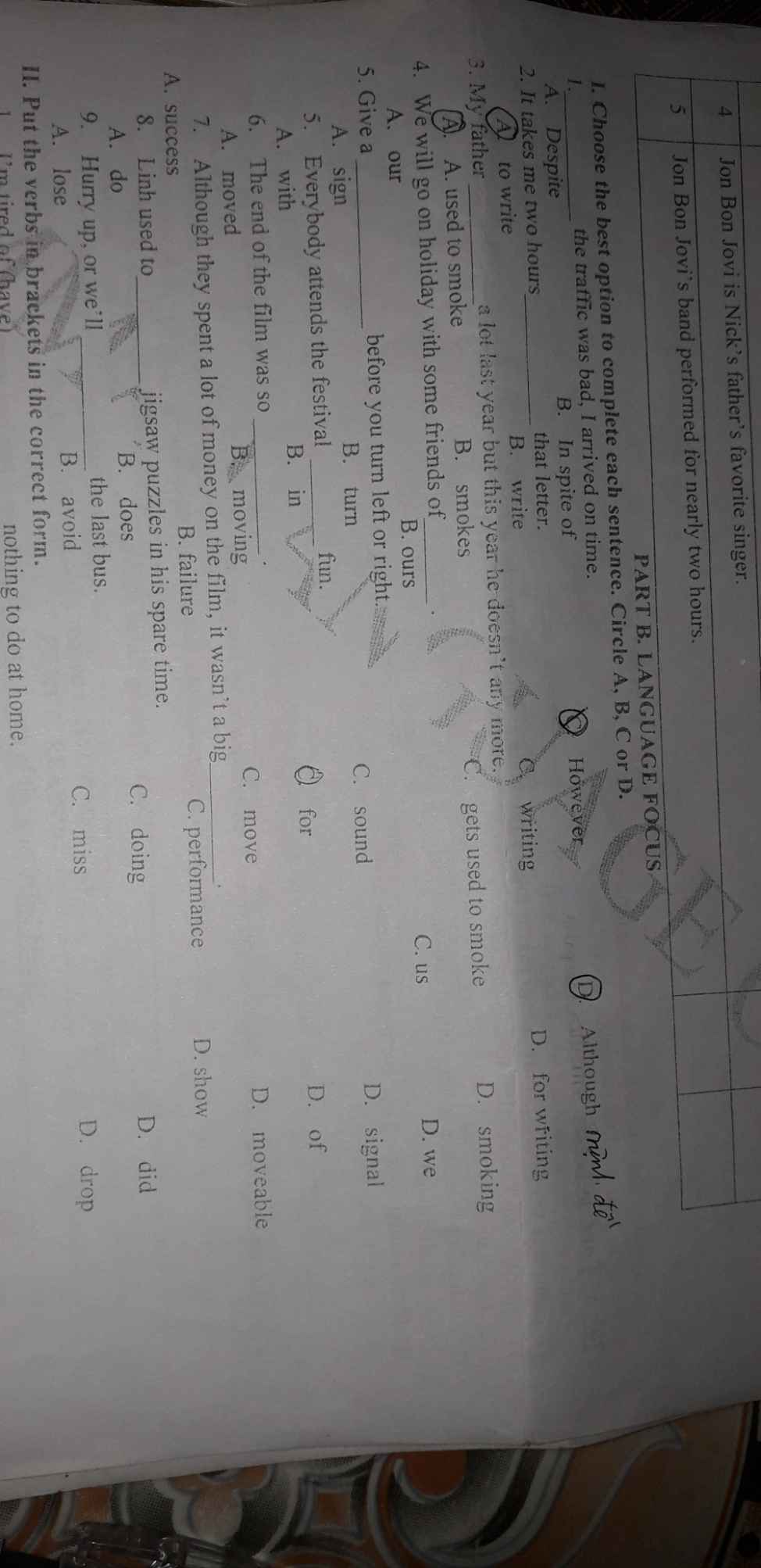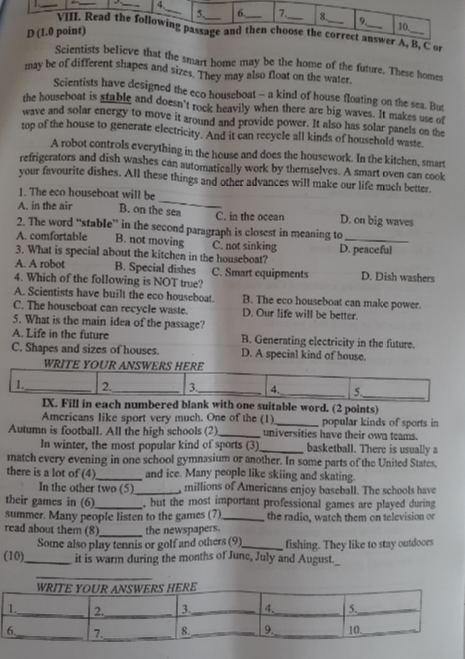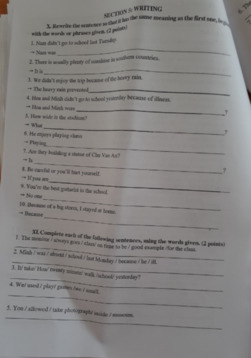Hãy nhập câu hỏi của bạn vào đây, nếu là tài khoản VIP, bạn sẽ được ưu tiên trả lời.

Exercise 2: Fill in the correct forms of adverbs and adjectives
1. Those shoes are (pretty)........prettier than.........................these ones.
2. Marissa is (young)...........younger than.....................I am.
3. Texas is (big)..............bigger than..................Arizona.
4. He is much (old).........older than ...............I expected.
5. During the volleyball game, the mothers seemed to be (energetic).............more energetic.................their daughters.
6. Planes fly (high).........higher than..................birds.
7. Nashla gets to school (early)........earlier than...................her sister Rosemary.
8. Frankie’s pitch this season was (bad).........worse than..................last season’s.
9. Dar. Rani’s office is (far)........farther......................down the block.
10. Apartment’s rentals in Brooklyn are (expensive).............the most expensive....................rentals in The Bronx.
Exercise 3: Put the verbs into correct forms using First or Second conditional sentences
1. If we (rent).............rent.........that big flat, we (have).............will have.........enough room for the dog.
2. I (buy)..........would buy............a huge house with a garden if I (win).............won.........the lottery.
3. If you (paint).........painted.............this room white it (be)..........would be............much lighter.
4. I (do)...........would do...........it myself if I (have).............had.........more time.
5. I (not be).........wouldn't be.............so broke if I (spend)............spent..........so much on going out.
6. Maybe if I (share)...........share...........a flat with friends, I (get on)..............will get on ........better with my parents.
7. I (can).............could.........travel next summer if I (have)........had................more money.
8. Carla (move).......would...............out of her shared flat if she (find)..............found........a job.
9. If my girlfriend (not have to).........didn't have to..........................work so hard, we (can)..............could........see each
other more often.
10. If I (go)..........went............to bed earlier, I (not be).......wouldn't be...............so tired all the time.
Exercise 4: Put the verbs into correct forms using The past simple tense, The past continuous tense or
The present perfect tense
1. My friend’s a great writer. He (write)has written lots of books so far.
2. We (not have)............didn't have.........a holiday last year, because there (not be)..........was not.. enough time for that.
3. The weather (be).......was........very good yesterday so Kelly (not stay)................didn't stay.................at home.
4. My hair is wet. I (just wash)have just washed it.
5. Is Sonia here? No, she (not come)hasn't come yet.
6. Do you know Martin’s sister? I (see)have seen her a few times but I have never spoken to her. Have You (ever speak)..ever spoken.........................to her? Yes, I
(meet)met her at a party last week. She’s very nice.
7. We (travel) have traveled around South America since June and (already
explore).........................have already explored........ an amazing historic site Machu Picchu in Peru.
8. Albert Einstein (be).......was...........the scientist who (develop)......developed..................the theory of relativity.
9. How long have you (use)..........used..............a bike to get around London? I (buy)..........bought..............this 2 weeks ago and I (ride)..........have ridden..............it every day since I got it.
10. My parents (live)..........have lived.......................in London since they (get married)............got married.................in 1975. They still adore this city.
Exercise 9: Write a short paragraph about a future means of transport, using the cues given.
Safe, environmentally friendly cars
1. Cars/ the future/ do less damage/ the environment/ and/ be equipped/ better safety devices/ limit/ number/accidents and deaths.
Cars in the future will do less damage to the environment and will be equipped better safety devices to limit the number of accidents and deaths.
2. Engines/ be powered/ by/ rubbish-fueled reactor/to make use/ all the waste we produce.
Engines will be powered by rubbish-fueled reactor to make use of all the waste we produce.
3. Petrol/ be replaced/ fuel cells/ separate hydrogen/ oxygen/ water.
Petrol will be replaced by fuel cells to separate hydrogen and oxygen in water.
4. Cars/ have sensors/ detect pedestrians/ other cars/ and/ have/ air cushions.
Cars will have sensors that detect pedestrians and other cars and will have air cushions.
5. Vehicles/ “talk”/ each other/ regulate flow/ it/ mean/ end/ traffic jams.
Vehicles can ''talk'' to each other to regulate flow, it means the end of traffic jams.(tham khảo c5)
6. Cars/ powered by fuel cells/ already developed.
Cars which are powered by fuel cells have already been developed.
7. We/ see/ this type of cars/ the roads/ twenty years.
We will see this type of cars on the roads in twenty years.
8. Environmental and safety improvements/ popular soon.
Environmental and safety improvements will be popular soon.

Wear: Dùng để nói khi bạn mặc quần áo, đi giày dép hay đeo trang sức. Trường hợp này sẽ được hiểu trên người bạn có quần áo, giày dép hay trang sức (tức là bạn có hoặc vẫn mặc, đi, đội, khoác (những) thứ đó v.v.
(Wear: When you wear your clothes, shoes or jewellery you have them on your body.)
Put on: Dùng để nói khi bạn để quần áo lên người mình để mặc vào. Và khi mặc xong thì bạn cởi ra.
Put on: When you put clothes on you place them on your body in order to wear them. And when you have finished wearing them, you take them off.
Wear còn có cách dùng đặc biệt như trong câu: He used to wear his hair short, but now he is wearing it long. (Anh ấy từng để tóc ngắn, nhưng giờ anh để tóc dài.)
Put on nghĩa là đưa vào đồ vật
Wear nghĩa là mặc đồ như mặc quần áo....



Chúng giống nhau và có thể dùng như nhau
○ First, I my job because it pays well. Second, my workplace is very close to my home.
○ Firstly, I my job because it pays well. Secondly, my workplace is very close to my home
Có 1 vài lưu ý đó bạn ạ

* Giống nhau:
- Về bản chất đều mang tính giai cấp và đẳng cấp.
- Mục đích chủ yếu là để bảo vệ quyền lợi của giai cấp thống trị, trước hết là đặc quyền đặc lợi của vua, triều đình, của các quan lại cao cấp, củng cố chế độ quân chủ trung ương tập quyền.
- Đều có một số điều luật khuyến khích nông nghiệp phát triển, ổn định xã hội.
* Khác nhau:
- Luật pháp thời Lý - Trần chưa đầy đủ và có một số điểm tiến bộ như luật pháp thời Lê sơ.
- Luật pháp thời Lê sơ được nhà nước rất quan tâm. Bộ luật Hồng Đức được ban hành là bộ luật hoàn chỉnh, đầy đủ, tiến bộ nhất trong các bộ luật thời phong kiến ở Việt Nam. Một số điều trong bộ luật Hồng Đức bảo vệ quyền lợi cho người phụ nữ, nô tì, giữ gìn truyền thống tốt đẹp của dân tộc,…

Men and women are a gender discrimination ideology that considers men more important than women. This was a thought system that existed in many parts of the world, especially under the feudal regime. Although women's rights are now recognized, the feminist ideology system is still in some countries, especially attached to religious ideas. In other regions, many people still carry this idea at different levels.
Vietnam is a country strongly influenced by feudal and Confucian ideology. It is rooted in many generations of life. There are sentences that "Most men write and write a woman" with the meaning of "a son is there but ten daughters are still not", demonstrating how to judge a son or woman in Confucianism. Accordingly, families or lineages from the past (and even today) still have the thought of attaching importance to the birth of a son. Without a descendant grandchildren is still considered to be great and when the parents or grandparents die, there will be no people and places of worship. So most families still have to try to give birth to a son. In addition to the positive aspects of moral education, the idea of male and female disrespect is no longer appropriate.
In the old society and today, the majority of women and girls are disadvantaged, many very well-off families have dozens of rooms but when married, they must live with their parents-in-law and siblings in the same room. narrow. My biological parents have no money to buy my own house because that's my husband's job, and my brother and my brother's brother leave so I don't have to worry ...
In terms of supporting parents, she and her younger sister often spend more time caring than him and her younger brother because their daughters always feel affectionate, filial to their parents, and more sons and daughters catch their parents. repaying the debt, everyone just said: "Birth of a son who is miserable, dead of joy; The old people said that after the loss, the soul of the full moon and the first day, the New Year, the death anniversary ... could only go to his son's house, and the house of the daughter who worshiped the inner side could not enter. Therefore, even though boys are still damaged, they are considered important, this is a negative point of view, needs to be renewed and reviewed in a way that is more appropriate.
Besides the majority, there are families with very innovative ideas: every child is the same, they are loved and cared for the same way, showing fairness. Daughters married poor are ready to live in the bridegroom or buy apartments to live in, as long as their daughter is happy. So is the son who gets married, equally inherited. These are people who know far-sighted and understand life.
Many families do not have sons and daughters who love their parents and should keep worshiping their parents 50% on the altar, or make a separate altar next to them, which many people carry heavy feudal thoughts. The project said that: immoral, verbal abuse of a cowardly son forced by his wife, afraid of his neighbors to assess and affect the happiness of many families, but what is wrong, morality teaches people to treat With each other humanity, every parent is equal to prohibit the daughter from worshiping.It is because of heavy thoughts that many grandparents force their children to give birth to a grandson and wife to give birth to 3 or 4 girls, otherwise they will be considered unfamiliar, this case is not rare. The old feudal ideologies if not liberated from it live very tightly, always afraid of being evaluated, detracting - the cause of broken happiness of so many families just because they love things for themselves where to go Being confident, overcoming it is very comfortable, all just towards a good life for yourself and your descendants, Boys or Girls are all your children and not necessarily have to give birth to a boy. . The ideology of lost men and women should be changed, so that men and women are equal in today's society.



- Sự khác nhau giữa khí hậu lục địa Nam Mĩ với khí hậu Trung Mĩ và quần đảo Ăng-ti: Khí hậu lục địa Nam Mĩ có sự phân hóa phức tạp do vị trí lãnh thổ kéo dài trên nhiều vĩ độ. Địa hình phân hóa đa dạng.
- Khí hậu eo Trung Mĩ và quần đảo Ăng-ti không phân hóa phức tạp do địa hình đơn giản, giới hạn lãnh thổ hẹp.